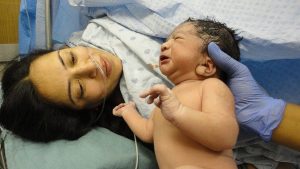If Your Baby Is Born Premature
 When a baby is born more than three weeks before the due date, it is said to be a premature baby. Premature babies have not grown or developed as much as they should have before they were born.
When a baby is born more than three weeks before the due date, it is said to be a premature baby. Premature babies have not grown or developed as much as they should have before they were born.
Why was my child born early?
Most of the time, doctors do not know why babies are born early. When they do know, it is usually because the mother had a health problem during pregnancy, such as:
- diabetes (high blood sugar)
- arterial hypertension (high blood pressure)
- heart or kidney problems
- an infection of the vagina, urinary tract, or amniotic membranes
Other reasons why a baby is premature also include the following:
- bleeding, due to the abnormal position of the placenta (placenta previa) or a placenta that separates from the uterus prematurely (placental abruption)
- having an abnormally shaped uterus
- being pregnant with more than one baby (twins, triplets, or more)
- being underweight before becoming pregnant or not gaining enough weight during pregnancy
- smoking, using drugs, or drinking alcohol during pregnancy
Does my baby need special care?
Yes, premature babies have many special needs. Small and shorter-term babies tend to have more health problems than full-term babies. For this reason, they often have to be cared for in a neonatal intensive care unit (NICU) . (Neonate is the same as newborn.)
Why does my baby have to keep warm?
Premature babies do not have the necessary body fat to maintain their body temperature. Incubators and radiant warmers keep them warm in the NICU:
- Neonatal warmers: these are cradles with warmers on top to help babies stay warm. Since these are open beds, they allow easy access to babies.
- Incubators: they are cradles surrounded by hard and transparent plastic walls. The internal temperature of the incubator is controlled so that the baby’s temperature is what it should be. Doctors, nurses, and others can care for your baby through the holes on both sides of the incubator.
What are my baby’s nutritional needs?
Breast milk is the best source of nutrition for all babies, especially premature babies. Breast milk contains proteins that help fight infection. Most premature babies cannot feed directly from the breast or suck from a bottle at first. Mothers can express milk using a pump and then give it to the baby through a tube, a tube that goes from the baby’s nose or mouth to the stomach.
 If the mother is unable to produce breast milk, doctors may suggest feeding the baby pasteurized human breast milk from a milk bank, which is considered a safe option.
If the mother is unable to produce breast milk, doctors may suggest feeding the baby pasteurized human breast milk from a milk bank, which is considered a safe option.
If you are unable or unwilling to breastfeed or express breast milk, your baby can be fed formula . Special additional nutrients called fortifiers can be added to breast milk or formula. This is because premature babies need more calories, more protein, and other nutrients than full-term babies.
Babies should be fed slowly because they could develop necrotizing enterocolitis , a serious intestinal problem that often affects premature babies.
Some premature babies who are very small or very sick are fed through an IV (or IV) line, which is known as “total parenteral nutrition” (TPN) . Total parenteral nutrition contains a special mix of nutrients, such as proteins, carbohydrates, fats, vitamins, and minerals.
Doctors and nutritionists carefully monitor the diet of premature babies and make changes when necessary to ensure that babies receive the nutrients they need to grow.



